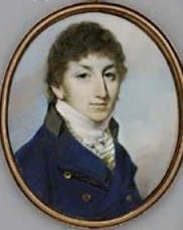Charles Elphinstone-Fleeming
| Charles Elphinstone Fleeming | |
|---|---|

Charles Elphinstone Fleeming
|
|
| Born | 18 June 1774 |
| Died |
30 October 1840 (aged 66) Leamington |
| Allegiance | United Kingdom of Great Britain and Ireland |
| Service/branch | Royal Navy |
| Rank | Admiral of the Blue |
| Commands held |
HMS Tisiphone HMS Tartar HMS Diomede HMS Egyptienne HMS Revenge HMS Bulwark HMS Standard HMS San Juan HMS Elizabeth West Indies Station Nore Command Portsmouth Command |
| Battles/wars | Battle of Cape Finisterre |
Admiral Charles Elphinstone Fleeming (18 June 1774 – 30 October 1840) was an officer of the Royal Navy who served during the French Revolutionary and Napoleonic Wars. He commanded a succession of smaller vessels during the early years of the wars, achieving some successes against French cruisers, merchants and privateers, before losing his ship on one operation. Combining his naval career with periods of political activity he took part in only one major fleet operation, the Battle of Cape Finisterre in 1805, but spent several years as a Member of Parliament. Connected by birth to a major noble landowning family several of his children went on to inherit or marry into titles and rank in the British peerage. Charles himself died an Admiral of the Blue with extensive Scottish estates.
Born Charles Elphinstone in 1774, he was the son of John Elphinstone, the 11th Lord Elphinstone, and his wife Anne Ruthven. He entered the Navy and by March 1794 and the age of 20 had reached the rank of commander aboard the sloop HMS Tisiphone. He moved aboard the 26-gun HMS Tartar on 7 October 1795 and commanded her until her loss in 1797 while attempting to cut some French merchantmen out under the batteries at Puerto Plata, on Saint-Domingue. He was then appointed to the 50-gun HMS Diomede in March 1798 which he commanded initially in the North Sea, but departing for the Cape of Good Hope on 6 December that year. He spent the rest of the war on the East Indies station, stepping down in December 1802 following the Peace of Amiens. He briefly entered politics during this period, having been elected Member of Parliament for the constituency of Stirlingshire on 13 January 1802. He had assumed the name Fleeming on the death of his grandmother, the only surviving child of John, 6th Earl of Wigtoun, and his succeeding to the family's estates.
...
Wikipedia
